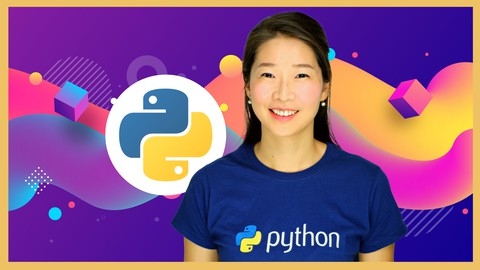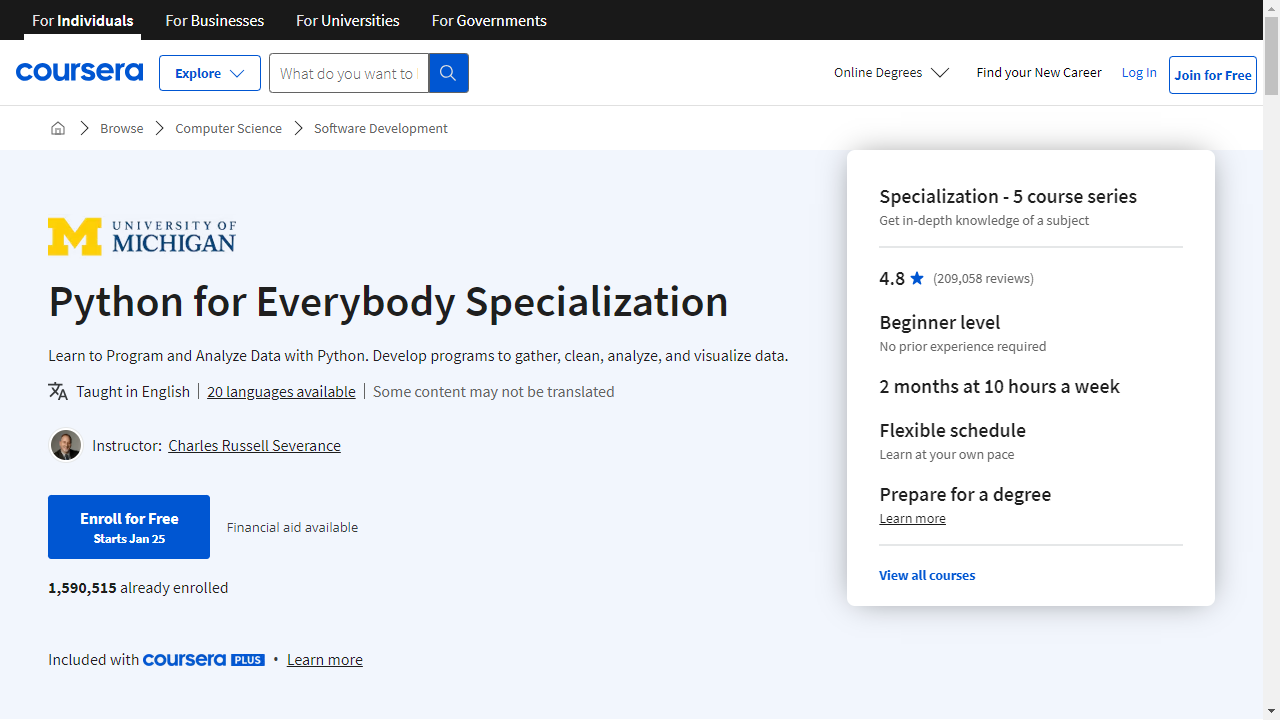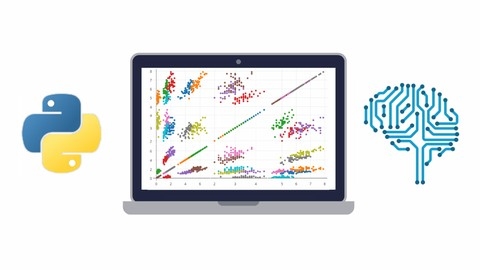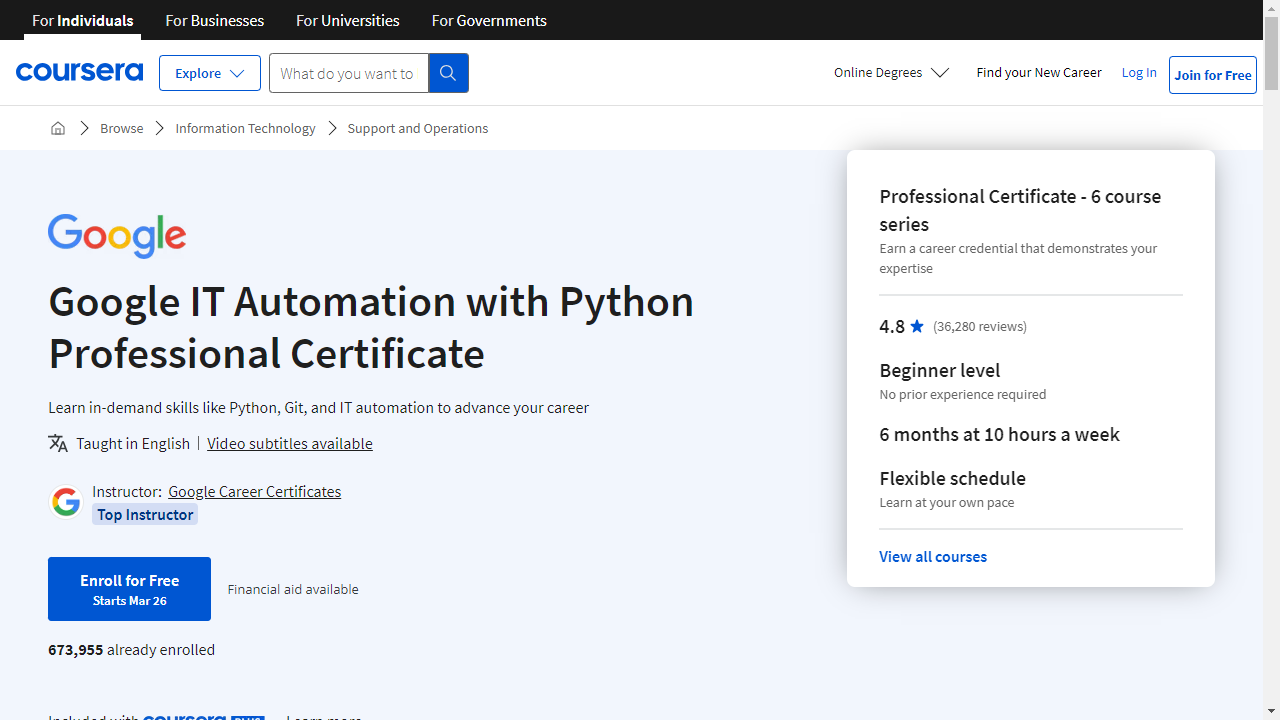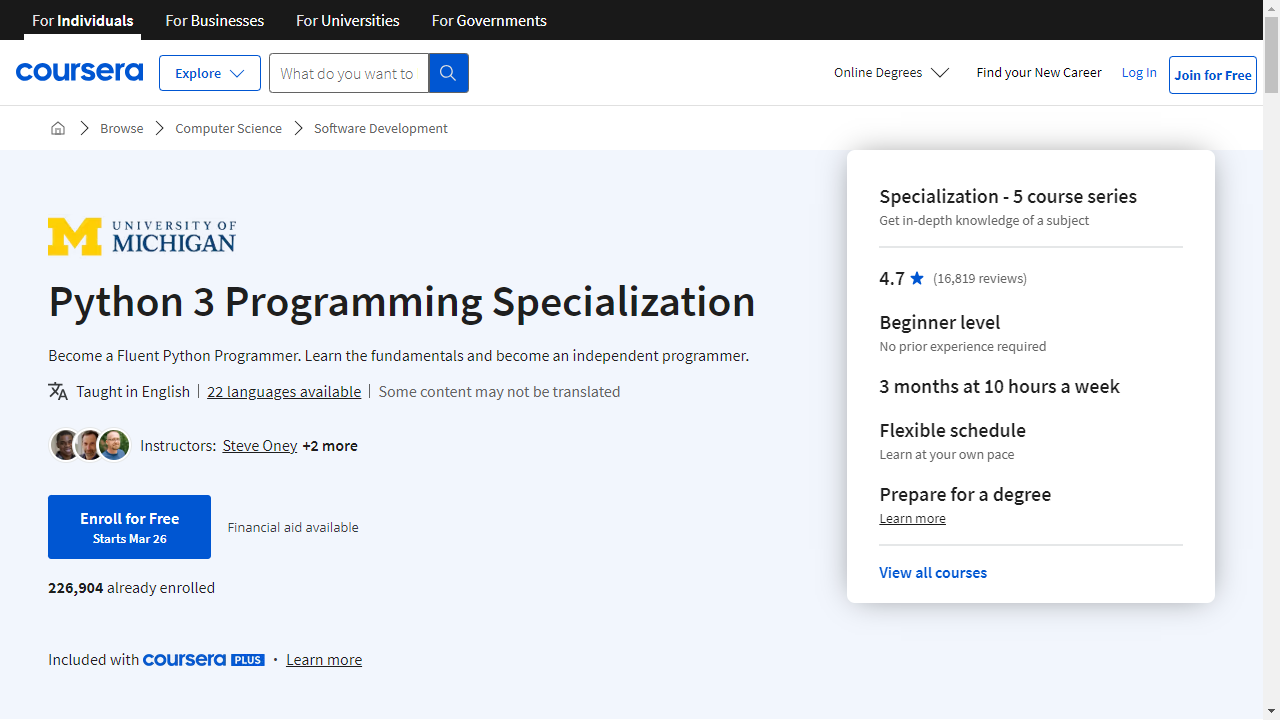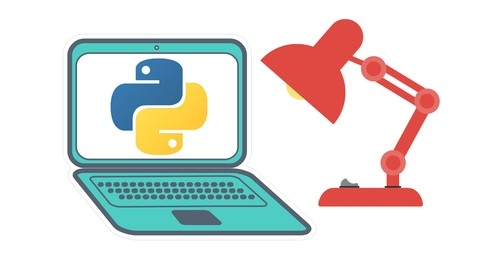Python is a versatile and powerful programming language used in a wide range of applications, from web development and data science to machine learning and artificial intelligence.
Learning Python can open doors to exciting career opportunities and empower you to build innovative solutions across various industries.
By mastering Python, you’ll gain the ability to automate tasks, analyze data, create websites, and even develop intelligent systems.
Finding the perfect Python course can be a daunting task, especially with the abundance of options available online.
You’re looking for a comprehensive and engaging course that caters to your learning style, whether you’re a complete beginner or an experienced programmer seeking to expand your skillset.
You want a course that provides a solid foundation in Python fundamentals while also offering practical exercises and projects to solidify your understanding.
Based on our research and analysis, we believe 100 Days of Code: The Complete Python Pro Bootcamp is the best Python course overall.
This Udemy course takes you from the basics to becoming a confident programmer, even if you’re starting from scratch.
With a combination of video lectures, coding exercises, and projects, you’ll learn everything from basic syntax to advanced concepts like object-oriented programming and web development.
While 100 Days of Code: The Complete Python Pro Bootcamp is our top recommendation, we understand that different learners have different needs and preferences.
That’s why we’ve compiled a list of other exceptional Python courses, each catering to specific learning styles, experience levels, and areas of focus.
Keep reading to discover the perfect Python course to embark on your programming journey!
100 Days of Code: The Complete Python Pro Bootcamp
Provider: Udemy
This Python course takes you from the basics to becoming a confident programmer, even if you’re starting from scratch.
You begin with simple concepts like using variables and understanding data types, then gradually advance to more challenging topics such as controlling the flow of your code with if/else statements and loops.
You learn about functions, which are like mini-programs within your code, and how to use them to break down complex tasks.
You discover useful ways to store and organize information with lists, dictionaries, and tuples.
As your journey continues, the course introduces you to the powerful world of object-oriented programming (OOP).
You’ll learn how to use classes and objects to structure your code in a way that makes it reusable and efficient.
Using these skills, you’ll tackle exciting projects like creating a blackjack game or a password generator.
As you go, you’ll become comfortable with debugging techniques that help you find and fix errors in your code.
The course then takes you beyond Python fundamentals, teaching you how to build applications with graphical user interfaces (GUIs) using Tkinter.
You’ll learn how to work with files and directories, and even dive into data analysis and manipulation with the Pandas library.
You’ll visualize data and create charts using Matplotlib and Seaborn, gaining a valuable skillset for understanding and presenting information.
You’ll also discover the power of web scraping with Beautiful Soup and Selenium, enabling you to extract data from websites and automate tasks like filling out forms.
Finally, you’ll explore the exciting world of web development with Flask.
You’ll learn how to build web applications, handle user interactions, and create dynamic web pages.
You’ll even dive into the world of data science, using powerful libraries like NumPy and scikit-learn to perform complex calculations and explore machine learning concepts like linear regression.
You’ll build projects like a house price predictor, gaining practical experience with data analysis and prediction.
Intermediate Python Nanodegree
Provider: Udacity
If you are looking to go beyond the basics of Python and are interested in web development, data science, machine learning, or fintech, this Nanodegree is for you.
You will dive into advanced Python techniques by mastering the foundations of data structures, functions, object-oriented programming, and file manipulation.
You will put these skills into practice by building a project that analyzes data about near-Earth objects.
You will then learn to navigate the world of large Python codebases, creating modules and utilizing powerful libraries like NumPy and Pandas for data manipulation and analysis.
You will also discover how Python is used in systems programming and web development, broadening your skillset even further.
This section culminates in a project where you build a motivational meme generator, combining creativity with technical prowess.
Finally, you will get an introduction to the command line interface in the Shell Workshop and learn how to enhance your LinkedIn profile and GitHub presence in the Career Services section.
Taught by industry experts with experience at companies like Hedron Vision and Ursa, and institutions like Stanford and Cornell University, this Nanodegree will provide you with practical skills and a portfolio to impress potential employers.
Python for Everybody Specialization
Provider: Coursera
The “Python for Everybody Specialization” on Coursera teaches you the fundamentals of programming computers using Python.
You’ll start with the basics like Python syntax, data types, and simple operations.
You’ll quickly learn how to write your first program and understand core programming concepts like functions and loops.
You’ll then move on to data structures in Python, like lists, dictionaries, and tuples, learning how to manipulate and analyze data.
You’ll discover how to read and write data from files and perform multi-step tasks like sorting.
The specialization then introduces you to the world of web data and shows you how to extract data from websites and APIs using techniques like web scraping.
You’ll become comfortable working with HTML, XML, and JSON data formats.
The course continues by introducing you to databases and how to interact with them using SQL.
You’ll learn to design databases, store data, and manage it effectively using SQLite3.
You’ll even learn how to use the Google Maps API to visualize data in engaging ways.
Finally, you’ll apply your knowledge in a capstone project where you’ll build your own applications to retrieve, process, and visualize data using everything you’ve learned throughout the specialization.
This includes using tools like D3.js to create interactive data visualizations.
Python for Data Science and Machine Learning Bootcamp
Provider: Udemy
This Python course is designed to guide you from the basics of Python to the complexities of data science and machine learning.
You begin by setting up your coding environment using tools like Python and Anaconda, essential for working with data.
Then, you’ll learn to use Jupyter Notebooks, a platform for writing and running your Python code.
With a solid Python foundation, you’ll explore data analysis techniques using powerful libraries like NumPy for numerical operations and Pandas for data manipulation and analysis.
You will discover how to visualize your data using Matplotlib, Seaborn, Plotly, and Cufflinks, creating insightful graphs and charts.
The course then introduces you to the world of machine learning, where you’ll build models that can learn from data.
You’ll cover algorithms like linear regression, logistic regression, and K-nearest neighbors, used for predicting outcomes and classifying data.
You’ll dive deeper into more advanced techniques such as Support Vector Machines, decision trees, random forests, and K-Means clustering, further enhancing your ability to analyze complex datasets.
Next, you’ll explore the world of big data, learning how to process and analyze massive datasets using Apache Spark, a powerful framework for handling large-scale data processing.
You’ll also learn about Amazon Web Services (AWS) and how to use its cloud platform for running Spark.
Finally, you’ll delve into the exciting field of deep learning, learning how to build complex models for tasks like image recognition and natural language processing using libraries such as TensorFlow and Keras.
You’ll even explore how to visualize your models and gain deeper insights using tools like TensorBoard.
Google IT Automation with Python Professional Certificate
Provider: Coursera
This Google IT Automation with Python Professional Certificate is a great way to learn Python and start a career in IT.
You will begin with the basics of Python programming, learning how to write simple programs and use important structures like lists and dictionaries.
You’ll even learn to create your own Python objects.
Next, you will discover how to use Python to interact with your computer’s operating system.
You will learn how to manipulate files, work with processes, and even master regular expressions, which are essential for working with text files.
You will also gain experience with the Linux command line, a critical skill in IT.
The program then introduces you to Git and GitHub, essential tools for version control and collaboration.
You will learn how to track changes in your code, revert to previous versions, and work with others on projects.
Then, you will develop crucial troubleshooting and debugging skills, learning to identify and solve common IT problems.
You will learn strategies for analyzing and finding the root cause of issues, which will help you become a better problem solver.
You will then learn about configuration management and the cloud.
You will discover how to use Puppet, a popular industry tool, to automate the management of large groups of computers.
You will also learn how to manage physical and virtual machines in the cloud and deploy changes safely.
Finally, you will put everything together by tackling real-world scenarios.
You will use what you’ve learned about Python modules, APIs, data serialization, and more to build your own solutions, just like you would on the job.
Python 3 Programming Specialization
Provider: Coursera
This Python 3 Programming Specialization on Coursera will take you from the fundamentals of Python to real-world applications.
You will begin with the “Python Basics” course, where you’ll learn about conditional statements, loops, and data structures like strings and lists.
You’ll use this knowledge to program a virtual Turtle to draw, understanding how your code works visually.
The specialization then introduces you to dictionaries, user-defined functions, and how to work with files.
You’ll understand local and global variables, utilize the sorted function, and even analyze simulated social media data, culminating in the creation of CSV files.
The curriculum then shifts to interacting with the internet.
You will learn to fetch and process data using the Python requests module to interact with REST APIs.
Next, you will delve into object-oriented programming, learning to create classes and employ inheritance for reusable and modular code.
You’ll discover how to override built-in methods, design classes effectively, and write automated tests.
Finally, you will apply your knowledge to a hands-on project utilizing libraries like Pillow, Tesseract, and OpenCV.
This project will task you with manipulating images, recognizing text using optical character recognition (OCR), and even identifying faces in images, showcasing your skills in a practical, engaging manner.
The Complete Python Bootcamp From Zero to Hero in Python
Provider: Udemy
This Python bootcamp takes you from knowing nothing about Python to feeling confident using it.
You begin by installing Python on your computer and using the command line.
From there, you will learn Python basics such as data types, variables, and operators.
You will practice writing Python code, learning about concepts like loops, functions, and object-oriented programming.
You will complete exercises and a milestone project to help you understand how these concepts work together.
Once you have the basics down, you will learn more advanced topics like modules and packages, which help you to add pre-built functionality to your programs.
Error and exception handling will help you to write more robust code.
You will use these skills to build a BlackJack game for your second milestone project, testing your skills while creating something fun.
Beyond the basics, you’ll delve into decorators, generators, and libraries like BeautifulSoup and Requests for web scraping.
You can use Python for data analysis by working with CSV files and even use it to automate tasks like sending emails.
These are just some of the many applications you will learn.
The course even touches upon advanced concepts like GUI development, showing you how to use tools like ipywidgets.
If you are interested in artificial intelligence or machine learning, the course introduces these concepts and libraries like TensorFlow and PyTorch.
AI Programming with Python Nanodegree
Provider: Udacity
This Udacity Nanodegree program equips you with the skills needed to become an AI programmer using Python.
You will begin by mastering the fundamentals of Python programming, including essential concepts like object-oriented programming and data structures.
This hands-on program lets you apply your knowledge immediately by building a dog breed image classifier.
The program introduces you to crucial libraries such as NumPy, Pandas, and Matplotlib, which are essential tools for any aspiring AI programmer.
You will dive into linear algebra and calculus, gaining a solid mathematical foundation for understanding the inner workings of AI algorithms.
The curriculum then delves into the exciting world of neural networks and deep learning, teaching you how to build sophisticated models using the powerful PyTorch library.
You will explore cutting-edge architectures like Transformer Neural Networks, commonly used in natural language processing.
You will solidify your learning by creating your own image classifier, demonstrating your ability to apply the concepts learned throughout the program.
In addition to technical skills, this Nanodegree helps you prepare for a successful AI career by providing valuable career services.
You will learn how to optimize your LinkedIn and GitHub profiles, showcasing your skills to potential employers.
You will also master version control using Git and GitHub, an essential skill for any developer.
Introduction to Programming Nanodegree
Provider: Udacity
This Nanodegree equips you with fundamental programming skills using Python and JavaScript, two highly sought-after languages in the tech industry.
You’ll begin by grasping the basics of web development with HTML and CSS, learning to structure and style web pages.
The curriculum then introduces you to Python, where you’ll explore core concepts like functions, strings, and lists.
This exploration culminates in a captivating project where you’ll build an adventure game.
You’ll then transition to more advanced Python concepts like file handling, interacting with web APIs, and the principles of object-oriented programming.
You’ll test these newfound skills by developing a classic Rock Paper Scissors game.
The Nanodegree doesn’t stop there.
You’ll also delve into JavaScript, learning about its data types, how to control program flow with conditionals and loops, and how to organize code with functions, arrays, and objects.
This knowledge is then put into practice as you build an interactive shopping cart.
Throughout this Nanodegree, you’ll work with VS Code, a widely used code editor, and familiarize yourself with Git and GitHub, essential tools for version control and collaboration in software development.
You’ll also receive guidance on career services, learning how to optimize your LinkedIn profile, make the most of GitHub, and research potential career paths.
Also check our posts on:
